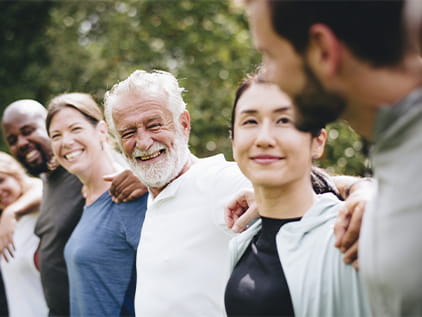October 04, 2022
Mental health professionals look for that point in their client where real progress can be made – their turning point. They may need just a little extra assist to getting better.
Helping people find the tools to achieve some resiliency in the face of stress, often caused by chronic illness, has been the calling card of Turning Point, an outreach of The University of Kansas Health System.
It started as its own thing back in 2001 by Moira Mulhern, PhD, a community psychologist, her friend Liz Paugoulatos and their founding board.
They moved into their current location 2 years later and still remain – at 89th and State Line on the Kansas side, across the street from Ward Parkway Center in Missouri. They also kept building a reputation as professionals who could help people who had undergone serious illness and treatment and in need of coping skills. Studies have shown these skills make living with chronic or serious illness so much better.
“We had been collecting data, and we knew our programs reduced anxiety, depression and stress at a highly significant level,” Mulhern said.
Trying out the program
They offer 700 programs throughout the year and somehow pull that off with only 8 employees and 75 contract facilitators. Mulhern’s staff invited me to sit on it 3 classes, 1 online and 2 in-person.
- That included “Mindful Awareness” on a Friday afternoon Zoom call. I learned with others what I was bringing into that Zoom: Tension in my shoulders because I was 2 minutes late logging on, anxiety from the week and going from 1 thing to the next and how I generally ignore all of this unless someone encourages me to be mindful about it.
- Next was a “T’ai Chi for Wellness.” I observed but didn’t participate. Those who did, many with chronic illness or pain, were taught that improving flexibility, concentration, balance, heart and lung activity and posture didn’t make the pain disappear. But it made dealing with it easier.
- I even watched an older group of people watch a video. Thrilling. I have to say, it was pretty interesting because the theme of the presentation was staying active. Inactivity, the speaker said, was the true threat to good health as senior.
We are an inoculation to stress, whether you’re sick or not. These are important things to pay attention to and to practice, so when things like a pandemic hit, we have the ability to manage that. You know, go with the flow. - Moira Mulhern, PhD
Co-founder and executive director of Turning Point
Joining the health system
About 10 years into Turning Point, Mulhern had a conversation with health system president and CEO Bob Page about the work they had been doing and the documented success. She says he commented, in so many words, “We should be doing that.” In short order, Turning Point was grafted into the health system.
“The health system recognized that families facing a diagnosis of a serious or chronic physical illness were challenged with long searches for education on how to manage the stress of illness, support networks and assistance in working with a healthcare team,” Mulhern told us for an article a year ago.
That – a year ago and at Turning Point’s 20th anniversary – marked another turning point.
Coping with the pandemic
The COVID-19 pandemic had been going strong for a while, and the ever-observant Mulhern knew she was witnessing a once-in-a-lifetime (we all hope) massive case study in resilience, or lack thereof.
You see, Turning Point’s services have always been free and are available to anyone, health system-connected or not. It’s a community service Page wants to provide. Mulhern and her colleagues came to realize that these coping skills work for the chronically ill, yes, but also for anyone dealing with stress. As in, just about everyone else.
That might very well be why Turning Point had been serving up to 10,000 people a year heading into the pandemic and now registers 15,000 participants using 700 programs.
She says we all have a threshold of what we can handle, and we can either hit it and ease back to manageability ourselves, or we boil over. Another way to say it: When we hit our threshold, if we don’t have the skills to come back down, we implode or explode.
The violent summer of 2020 looked like a macro version of explosion to her, and the implosions came in the form of overeating, drinking too much and isolating, “which shows you how important the things we teach are for everyone, not just sick people,” she said. “I mean, these are skills that teach people how to cope with whatever comes their way.”
Finding a new normal
For its 21st year, Turning Point is slowly bringing back in-person classes and will continue to offer online and hybrid courses, ready to adapt if the virus roars back in the fall and winter.
The “good problem to have” is that they’re dealing with the huge increase in interest.
“I did not expect that big of an increase, the well population seeking out our services,” she said. “After about a year into it, I thought, I’m going to start asking our participants how they’re doing. They’re at home, the isolated or they’re sick. Or they’re supporting someone who’s sick. And they were fine because of what they learned here.
“We are an inoculation to stress, whether you’re sick or not. These are important things to pay attention to and to practice and to have in your toolbox, so that when things like a pandemic that continues for 3 years hits, we have the ability to manage that. You know, go with the flow.”

Turning Point
Turning Point offers free classes, programs and tools designed to empower and educate people affected by chronic or serious illness.





